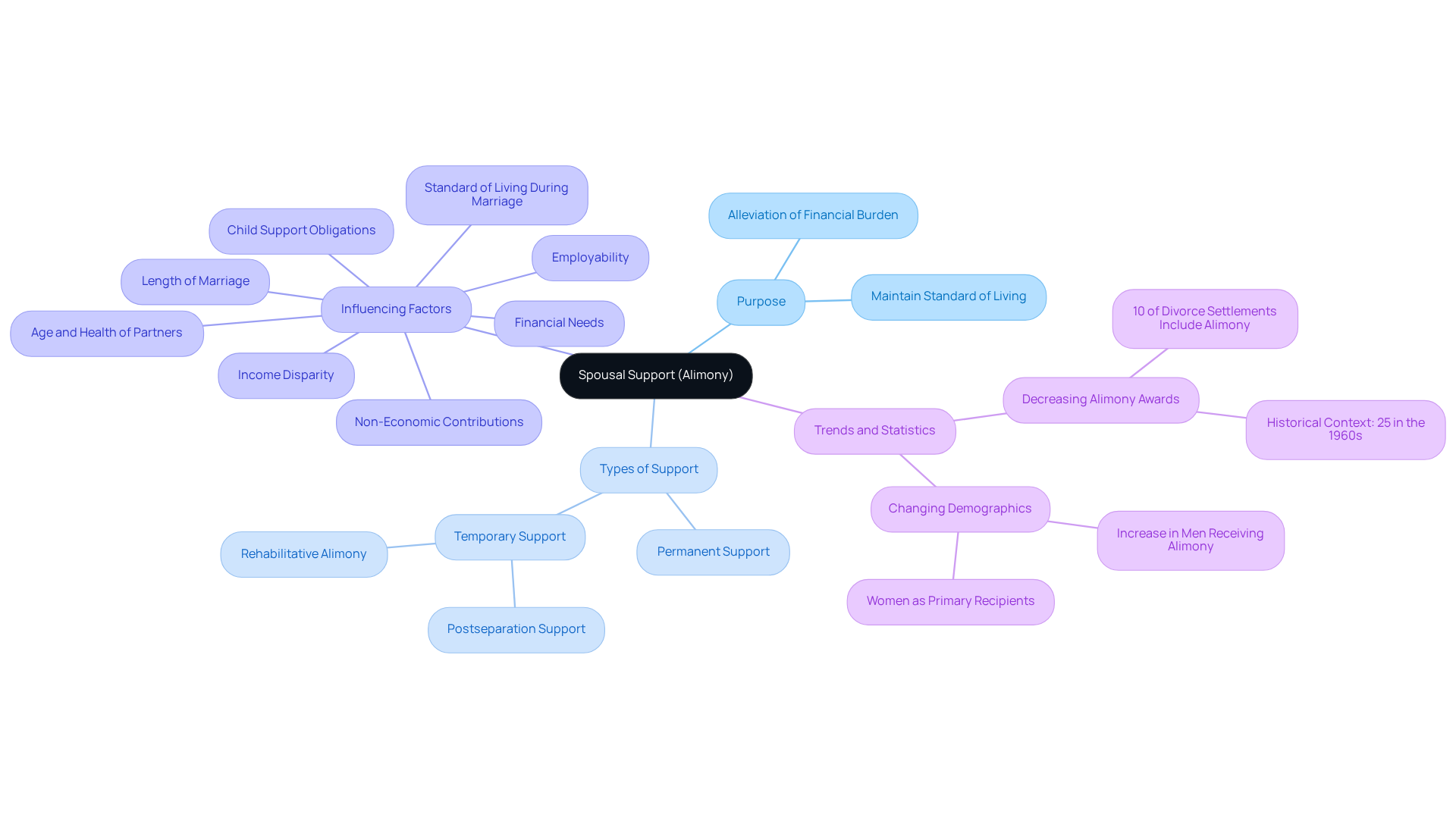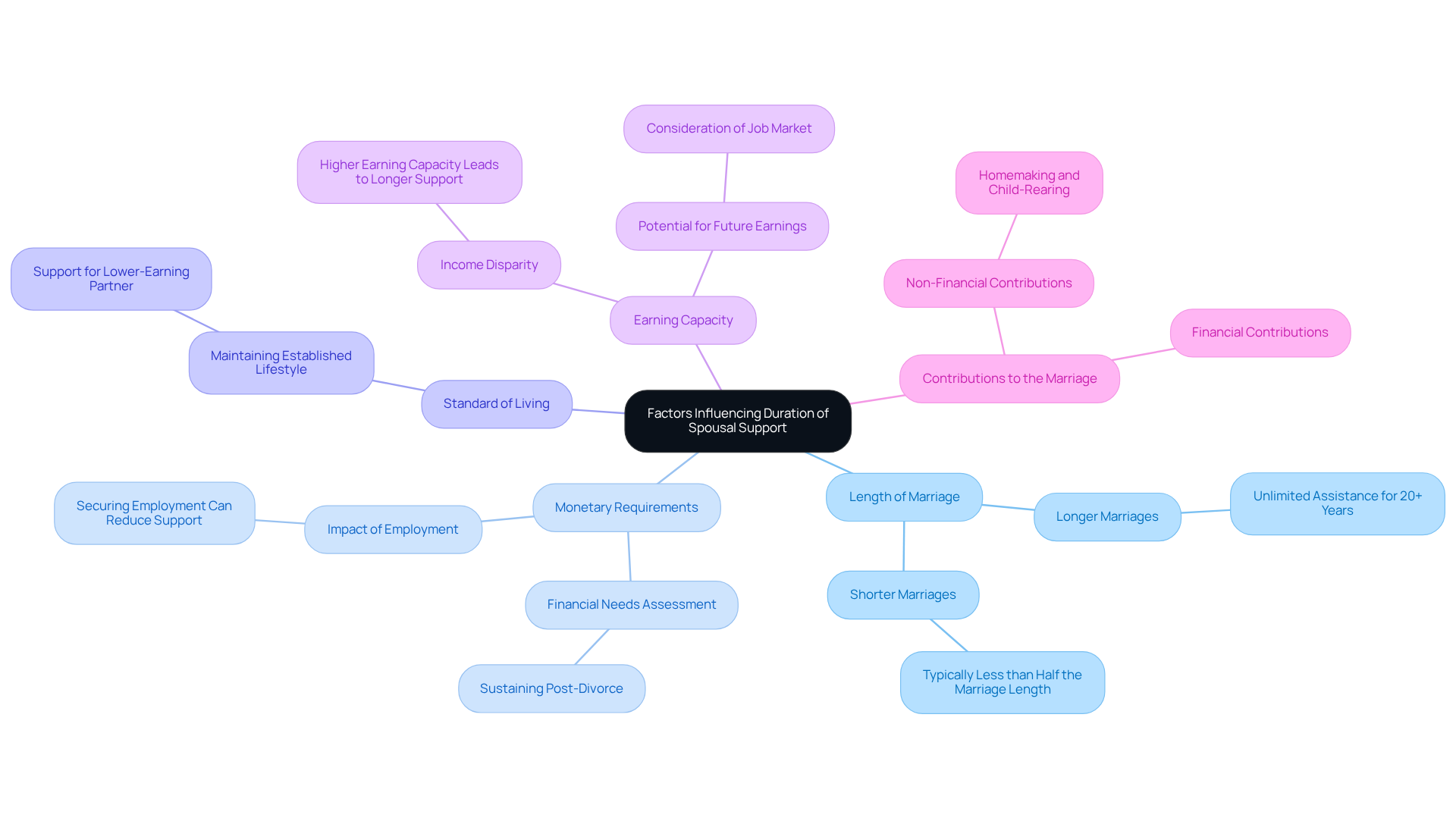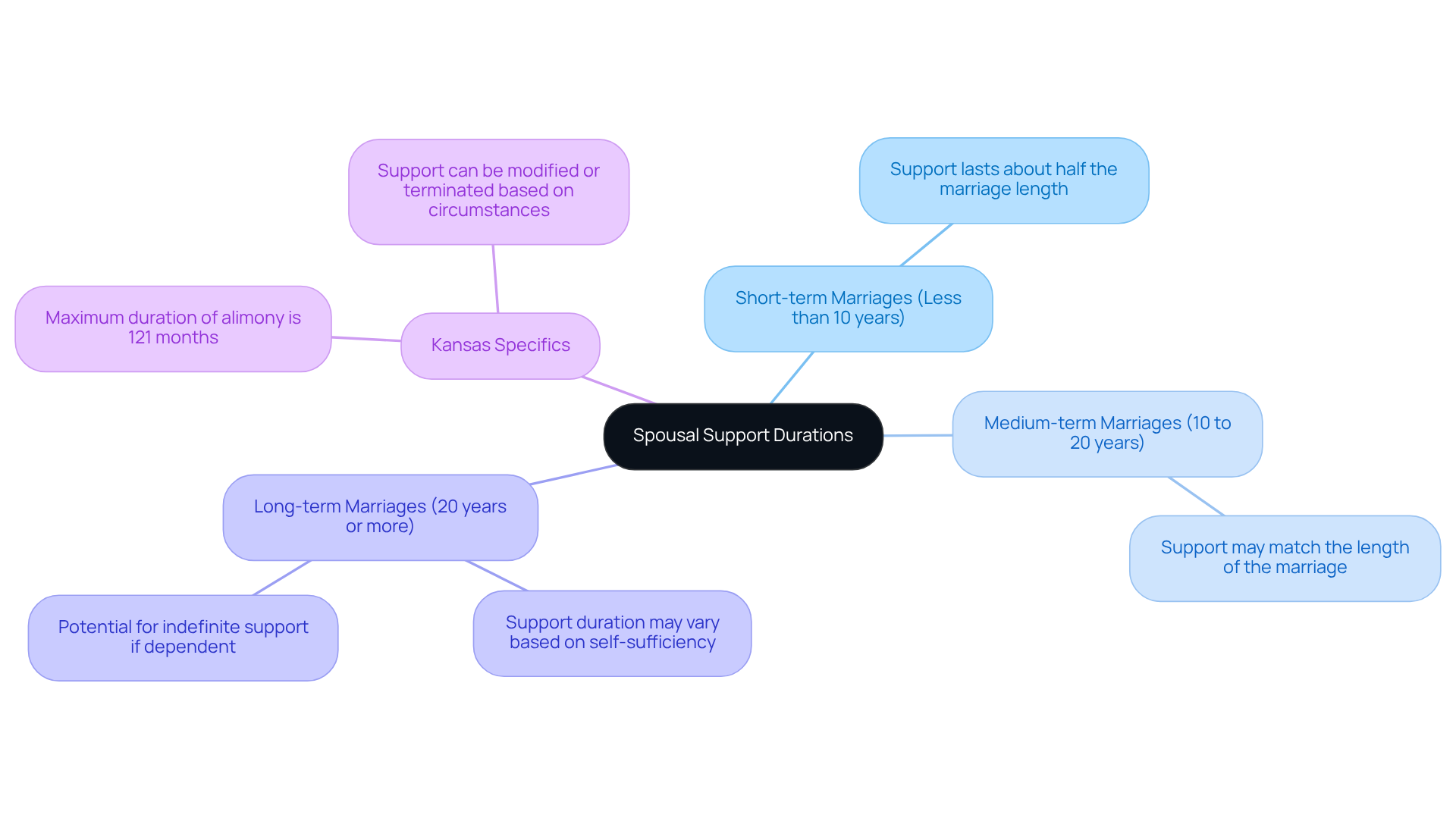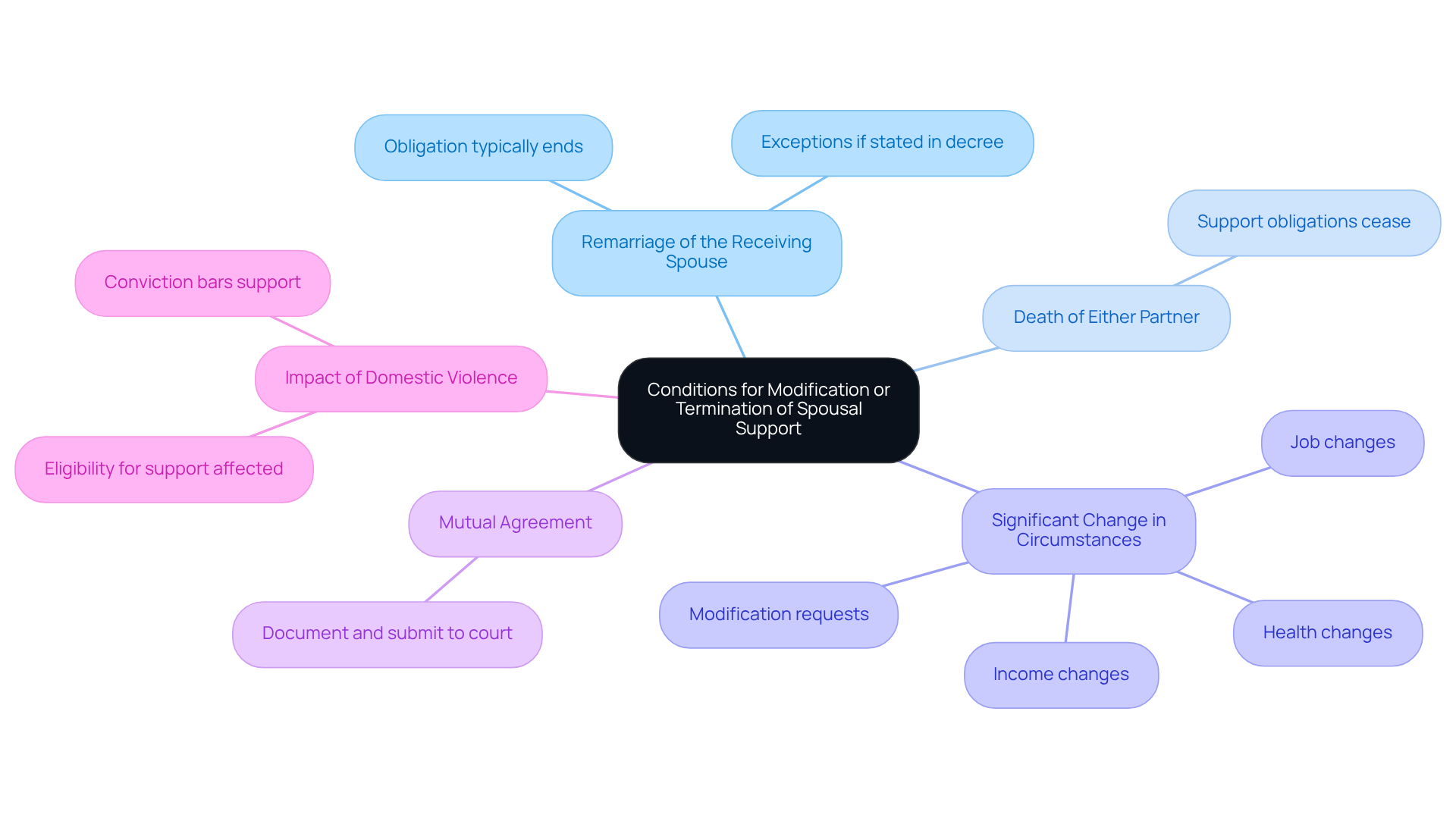Overview
Spousal support, often known as alimony, can feel overwhelming. Have you ever wondered how long it lasts? The truth is, it varies based on several key factors:
- The duration of the marriage
- The financial needs of the receiving spouse
- Their ability to become self-sufficient
All play a role in determining how long support will continue.
Typically, support lasts about half the length of short-term marriages. For medium-term unions, it can match the marriage length. And in long-term marriages, it may even be indefinite, reflecting the established lifestyle and economic interdependence that developed over the years.
Understanding these factors is crucial. It’s important to know that you have rights and options. You don’t have to navigate this alone—we’re here to fight for you. Your future matters to us, and we’ll guide you every step of the way.
Introduction
Navigating the complexities of spousal support can feel overwhelming, especially during the emotional upheaval of divorce. This financial assistance, often called alimony, is designed to ease the economic strain that can come with marital separation, helping both partners maintain a similar standard of living. But here’s the thing: the duration of spousal support isn’t the same for everyone. It depends on various factors, like:
- How long the marriage lasted
- The financial situations of each partner
Have you ever wondered what happens when these factors collide? How can you prepare for the potential challenges ahead? It’s crucial to understand that you’re not alone in this fight. We’re here to help you navigate these waters with clarity and support.
Define Spousal Support and Its Purpose
Spousal assistance, often called alimony, is a legal obligation for one partner to provide financial support to the other during or after a divorce. Have you ever felt the weight of financial uncertainty during such a tough time? The main goal of spousal assistance is to ease the unfair financial burdens that can arise from a divorce, helping both individuals maintain a similar standard of living to what they had during their marriage.
This support can be temporary or permanent, which raises the question of how long does spousal support last, depending on factors like the length of the marriage and the financial needs of the receiving partner. It’s crucial to understand this concept, especially when navigating the complexities of divorce. Knowing your rights can significantly impact your financial management and future stability. Remember, you’re not alone in this fight—we’re here to support you every step of the way.

Identify Factors Influencing Duration of Spousal Support
Several key factors significantly influence the duration of spousal support, and understanding them is crucial for anyone navigating this complex process:
-
Length of Marriage: The longer the marriage, the longer the support typically lasts. For unions lasting over 20 years, courts may grant unlimited assistance, reflecting the established lifestyle and economic interdependence.
-
Monetary Requirements: The financial needs of the receiving spouse are paramount. Courts assess their ability to sustain themselves post-divorce, which can lead to extended support if they struggle to achieve financial independence.
-
Standard of Living: Courts aim to maintain the standard of living established during the marriage. This often results in extended support for the lower-earning partner, ensuring they can uphold a similar lifestyle after separation.
-
Earning Capacity: The income and earning potential of both partners play a vital role in determining support duration. If the paying spouse has a higher earning capacity, they may be required to provide assistance for a longer period.
-
Contributions to the Marriage: Both financial and non-financial contributions, like homemaking and child-rearing, are considered. Courts recognize these sacrifices when deciding on the length of support.
Understanding these factors can empower individuals preparing for negotiations and court proceedings regarding spousal support. They can significantly influence the outcome of support arrangements, and knowing your rights is the first step in the fight for your future.

Outline Typical Durations for Spousal Support
Navigating spousal assistance can feel overwhelming, especially when the rules seem unclear. The length of support, or how long does spousal support last, varies significantly based on individual circumstances. Here’s a breakdown:
- Short-term Marriages (Less than 10 years): Typically, support lasts for about half the length of the marriage. For instance, if you were married for 6 years, you might expect support for around 3 years.
- Medium-term Marriages (10 to 20 years): In these situations, it is important to consider how long does spousal support last, as it could match the length of the marriage or be slightly less.
- Long-term Marriages (20 years or more): In these cases, questions about how long does spousal support last might arise, especially if the receiving partner struggles to achieve self-sufficiency due to age, health, or other factors.
In Kansas, it’s important to note that the maximum duration for alimony payments is 121 months. This detail can significantly impact those seeking spousal assistance. Additionally, support can be adjusted or terminated if circumstances change, like the recipient gaining financial independence or the paying partner facing financial hardships.
As legal experts remind us, "Even if you can prove you are 'the dependent party,' there are still many factors a judge will consider when deciding if you will get alimony and how much you will get." Consulting with a family law attorney is crucial. They can provide personalized guidance, clarify how these factors apply to your situation, and ensure your rights are protected.
Remember, you’re not alone in this fight. We’re here to support you every step of the way.

Explain Conditions for Modification or Termination of Spousal Support
Navigating marital assistance can feel overwhelming, but understanding the key conditions can make a significant difference in your financial responsibilities after divorce. Here’s what you need to know:
-
Remarriage of the Receiving Spouse: If the spouse receiving support remarries, the obligation to continue payments typically ends. This is based on the idea that the new marriage provides economic stability, reducing the need for support from the previous partner. However, if the divorce decree states that support continues despite remarriage, that obligation may still apply.
-
Death of Either Partner: Support obligations cease upon the death of either the paying or receiving partner, eliminating any further financial responsibility.
-
Significant Change in Circumstances: Life can throw curveballs—changes in income, health, or other major events can impact financial needs. For example, if the paying spouse faces a significant income drop or the receiving spouse finds a job, these shifts may warrant a modification of support. The payer's ability to pay is also crucial in determining if changes are appropriate.
-
Mutual Agreement: Both parties can agree to modify or end assistance. It’s essential to document these agreements and submit them to the court for approval to ensure they’re legally binding.
-
Impact of Domestic Violence: Domestic violence can heavily influence eligibility for spousal assistance. In California, a partner found guilty of domestic abuse against the other within five years is barred from receiving support.
Understanding these conditions is vital. They directly affect your financial arrangements and obligations after a divorce. Remember, you’re not alone in this fight—we’re here to support you every step of the way.

Conclusion
Navigating the complexities of spousal support can feel overwhelming, especially during the challenges of divorce. This financial assistance, often called alimony, is designed to ease the economic burdens that arise when a marriage ends. The duration of spousal support varies widely, influenced by factors like the length of the marriage, the financial needs of the receiving spouse, and the standard of living established during the marriage. Understanding these elements is crucial for both parties to reach a fair and equitable resolution.
Key points throughout this discussion highlight the various influences on how long spousal support may last:
- The length of the marriage
- The earning capacity of both partners
- Contributions to the marital home
Additionally, we outline typical durations for short, medium, and long-term marriages, providing clarity for those unsure of what to expect. It's also important to know that conditions for modifying or terminating spousal support—like remarriage or significant changes in circumstances—underscore the dynamic nature of these financial obligations.
Ultimately, grasping the ins and outs of spousal support is vital. Individuals must educate themselves about their rights and the factors that will shape their financial future after divorce. Seeking personalized guidance from legal experts can empower you to navigate this complex landscape effectively. By doing so, you can protect your interests and face the challenges ahead with confidence. Remember, you’re not alone in this fight—your future matters to us.
Frequently Asked Questions
What is spousal support?
Spousal support, also known as alimony, is a legal obligation for one partner to provide financial support to the other during or after a divorce.
What is the purpose of spousal support?
The main purpose of spousal support is to ease the unfair financial burdens that can arise from a divorce, helping both individuals maintain a similar standard of living to what they had during their marriage.
How long does spousal support last?
The duration of spousal support can be temporary or permanent and depends on factors such as the length of the marriage and the financial needs of the receiving partner.
Why is it important to understand spousal support?
Understanding spousal support is crucial when navigating the complexities of divorce, as it can significantly impact financial management and future stability.




